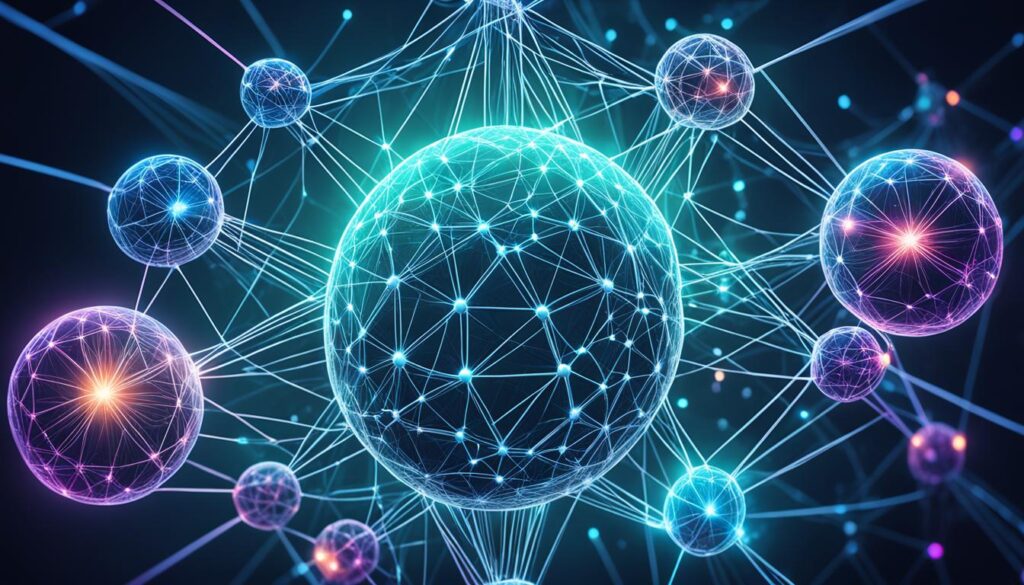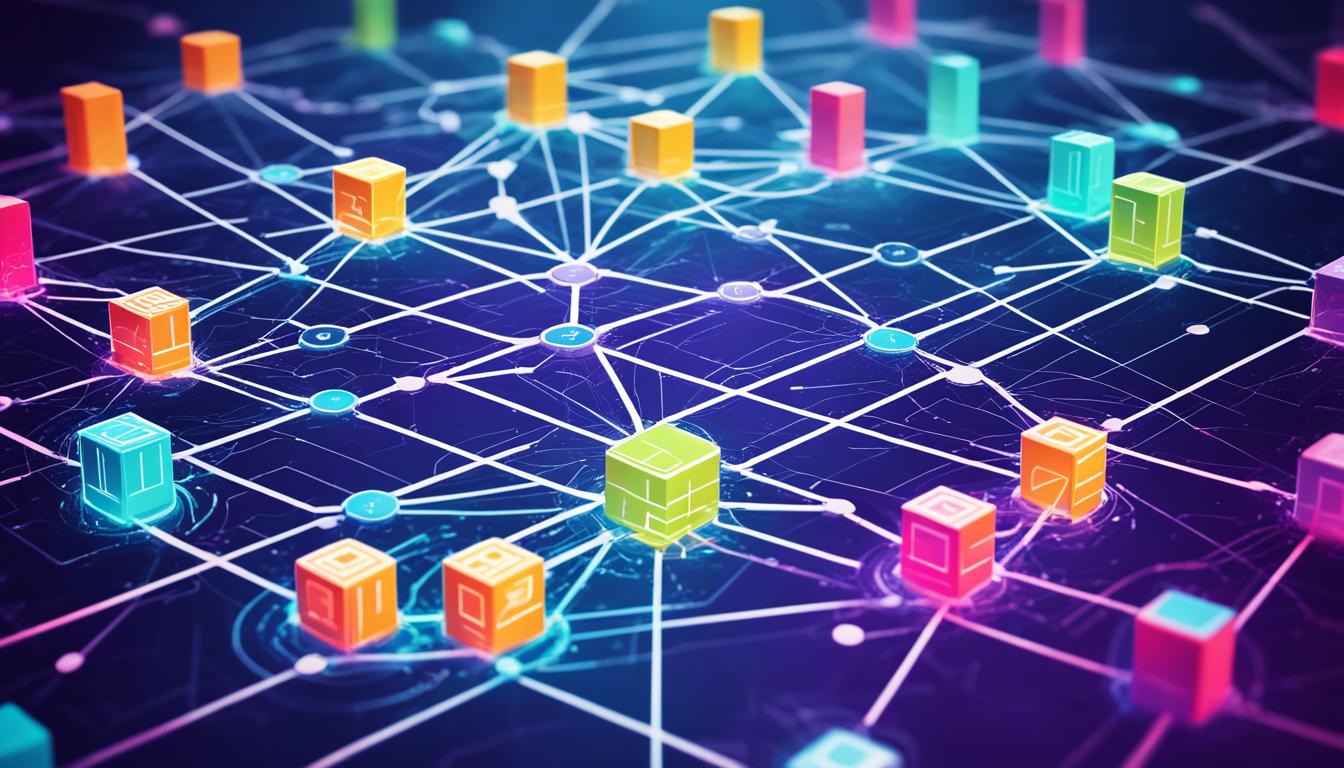Decentralized Autonomous Organizations (DAOs) are revolutionizing traditional governance structures by utilizing blockchain technology and smart contracts. As the world becomes increasingly digital, the integration of blockchain technology into various industries has opened up new possibilities for decentralized decision-making and transparent governance.
DAOs function differently from traditional organizations as they are run by code rather than being managed by centralized authorities. Through blockchain governance and smart contracts, DAOs can operate autonomously according to a set of rules encoded into their smart contracts. These rules define how decisions will be made, how funds will be managed, and how participants can exercise their voting rights.
By leveraging blockchain technology, DAOs provide transparency and immutability, ensuring that every transaction and decision made within the organization is traceable and cannot be changed retroactively. This level of transparency builds trust among participants and eliminates the need for intermediaries or third-party oversight.
Participants in a DAO can become token holders by purchasing tokens, giving them the right to vote on proposals and actively participate in the decision-making process. This decentralized structure enables individuals from all walks of life to contribute their ideas and expertise, making DAOs a powerful tool for inclusivity and collective intelligence.
While DAOs are still in their early stages of development, they have the potential to redefine organizational structures in sectors such as finance, governance, supply chain management, and more. With blockchain technology at the core, DAOs offer a new way to empower communities and enable collective decision-making.
Key Takeaways:
- DAOs utilize blockchain technology and smart contracts to revolutionize governance structures.
- Decentralized decision-making and transparency are key features of DAOs.
- Participants in DAOs can exercise their voting rights through token ownership.
- Blockchain technology ensures transparency, immutability, and eliminates the need for intermediaries.
- DAOs have the potential to transform various industries through inclusive participation and collective intelligence.
What is a DAO and Why Use It?
A decentralized autonomous organization (DAO) is a revolutionary type of organization that operates through code and is governed by a set of rules encoded into a smart contract. DAOs offer numerous advantages over traditional organizations, including increased efficiency, transparency, and security.
- Efficiency: DAOs streamline decision-making processes by eliminating the need for intermediaries. With automated smart contracts, DAOs can execute transactions and implement policies faster and more accurately.
- Transparency: Unlike centralized organizations where decision-making processes are often opaque, DAOs are built on blockchain technology, making their rules and decisions publicly available. This transparency enables easy verification and builds trust among participants.
- Security: DAOs are inherently more secure than centralized organizations. With decentralized governance and immutable smart contracts stored on a blockchain, DAOs are less susceptible to fraud, corruption, and malicious attacks.
By leveraging these advantages, DAOs provide a decentralized decision-making process where participants have voting rights and the ability to propose changes to the organization’s rules. This not only empowers individuals within the organization but also promotes inclusivity and collective decision-making.

How Do DAOs Work and How Are They Governed?
Decentralized Autonomous Organizations (DAOs) operate through the use of smart contracts, which are self-executing contracts stored on a blockchain. These smart contracts serve as the backbone of a DAO, defining its rules, operations, and decision-making processes. By leveraging blockchain technology, DAOs ensure transparency, immutability, and security in their governance.

In a DAO, participants hold tokens that grant them voting rights and the ability to contribute to decision-making. These token holders play a crucial role in the governance of the organization. DAOs often employ a voting system where token holders can cast their votes on various proposals and amendments.
“DAOs rely on decentralized governance and consensus-based decision-making.”
Proposals submitted by token holders are voted upon by the DAO community. The proposals that receive the most votes are adopted and implemented within the organization. This democratic voting system ensures that all participants have a say in the decision-making process and reinforces the principles of decentralization.
Token holders also have the power to propose changes to the DAO’s rules and operations through a proposal system. These proposals can range from minor amendments to significant overhauls of the organization’s structure. Amendments to the DAO’s rules require the approval of a majority of token holders, further emphasizing the democratic nature of DAO governance.
Example Proposal System
| Proposal | Votes |
|---|---|
| Implement a new funding mechanism | 145 |
| Amend DAO’s voting rules | 203 |
| Introduce a new feature | 90 |
Through smart contracts and decentralized governance, DAOs have revolutionized traditional decision-making processes. They provide a transparent and inclusive platform for participants to collaborate, vote, and propose changes, ultimately shaping the future of the organization.
Challenges and Future of DAOs
As decentralized autonomous organizations (DAOs) continue to gain traction in various industries, they face several challenges that need to be addressed to ensure their widespread adoption and success.
Security vulnerabilities are a significant concern for DAOs, as they can be vulnerable to hacks and attacks. The decentralized nature of DAOs, while providing many benefits, also poses risks in terms of ensuring the security of the platform and the funds held by the organization. Implementing robust security measures, such as thorough code audits and secure smart contract development practices, is crucial to safeguarding the integrity and protecting the assets of DAOs.
Governance in DAOs can be slow and difficult due to the consensus-based decision-making process. In traditional organizations, decisions are often made by a small group of individuals, whereas in DAOs, decisions are made collectively by token holders. Achieving consensus can be time-consuming and challenging, especially when there are numerous stakeholders with different perspectives and interests. Streamlining the governance process and ensuring effective communication and coordination among participants will be key to overcoming these challenges.
However, despite these challenges, the future of DAOs looks promising. As technology matures and the security and governance aspects are addressed, DAOs have the potential to revolutionize organizations and make a real difference in multiple industries.
DAOs offer more efficient and transparent alternatives to traditional organizations, enabling participants to have a direct say in decision-making processes. The use of blockchain technology and smart contracts ensures transparency, immutability, and tamper-proof transactions, further enhancing the trustworthiness of DAOs.
With the ability to provide secure and decentralized governance, DAOs have the potential to empower communities and enable collaboration on a global scale. As more organizations and individuals recognize the benefits and value of DAOs, we can expect to see their widespread adoption and integration into various sectors, such as finance, supply chain management, and governance.
DAOs hold the key to a future where decision-making power is distributed, and traditional hierarchical structures are replaced by decentralized networks. They have the potential to reshape the way organizations operate and bring about a new era of transparency, efficiency, and inclusivity.
The Future of DAOs
The future of DAOs is bright, with immense potential to transform industries and empower communities. As technology advances and the challenges are overcome, we can expect to see a widespread adoption of DAOs and the emergence of innovative use cases.
Here are some key aspects that highlight the future of DAOs:
- Increased adoption: As awareness and understanding of DAOs grow, more organizations and individuals will embrace their potential. DAOs have the ability to streamline processes, reduce intermediaries, and provide greater transparency and efficiency, making them an attractive option for businesses and communities.
- Enhanced security: With the advancements in blockchain technology and the implementation of robust security measures, the security vulnerabilities associated with DAOs can be mitigated. This will further enhance trust and confidence in the platform, encouraging more participants to engage in DAO ecosystems.
- Governance innovations: The challenges related to governance in DAOs can be addressed through technological advancements and the introduction of innovative governance models. This includes exploring new consensus mechanisms, decision-making protocols, and incentive structures to improve the efficiency and effectiveness of DAO governance.
In conclusion, the future of DAOs is promising, with the potential to revolutionize organizations and create a more inclusive and transparent global economy. As security and governance challenges are overcome, DAOs will become an integral part of various industries, paving the way for a decentralized and collaborative future.
Conclusion
Blockchain innovation has revolutionized the world of decentralized decision-making, paving the way for the development of Decentralized Autonomous Organizations (DAOs). These organizations leverage smart contracts and blockchain governance to enhance transparency, efficiency, and security in decision-making processes. While DAOs still face certain challenges and are in their early stages, they hold immense potential to transform the operations of traditional organizations and revolutionize multiple industries.
DAOs represent a novel approach to organizing and managing collective human action. By utilizing blockchain technology, they enable participants to have a direct say in the decision-making processes. This decentralized decision-making not only fosters greater inclusiveness and participation but also ensures that the organization’s rules and operations are upheld in a transparent and secure manner.
The future of DAOs is bright as the technology continues to evolve and overcome existing challenges. With ongoing advancements in security measures and the development of efficient governance systems, DAOs are well-positioned to gain popularity and become more mainstream. As more industries recognize the potential of blockchain and decentralized decision-making, we can expect to see the proliferation of DAO technology in various sectors, driving innovation and transforming how organizations operate.
FAQ
What is a decentralized autonomous organization (DAO)?
A DAO is a type of organization run by code and governed by a set of rules encoded into a smart contract. It utilizes blockchain technology and smart contracts to enable decentralized decision-making and transparent governance.
How do DAOs work?
DAOs utilize smart contracts, which are self-executing contracts stored on a blockchain. These smart contracts define the rules and operations of the DAO, including decision-making processes and fund management. Participants in a DAO can purchase tokens to have voting rights and participate in decision-making processes.
What are the advantages of using a DAO?
DAOs offer increased efficiency, transparency, and security compared to traditional organizations. They are not subject to fraud and corruption that can occur in centralized organizations. The use of smart contracts stored on a blockchain ensures immutability and tamper-proof transactions. DAOs provide a decentralized decision-making process, giving participants voting rights and the ability to propose changes to the organization’s rules.
What challenges do DAOs face?
DAOs face challenges such as security vulnerabilities and the need for decentralized decision-making. Security vulnerabilities can make them vulnerable to hacks and attacks. Governance in DAOs can be slow and difficult as decisions need to be made by consensus. However, as technology matures and challenges are addressed, DAOs have the potential to revolutionize organizations and make a real difference in various industries.
What is the future of DAOs?
The future of DAOs looks promising. As technology evolves and challenges are overcome, DAOs have the potential to become more mainstream and revolutionize how organizations operate. They provide a new way of organizing and managing collective human action, with the ability to transform multiple industries.








